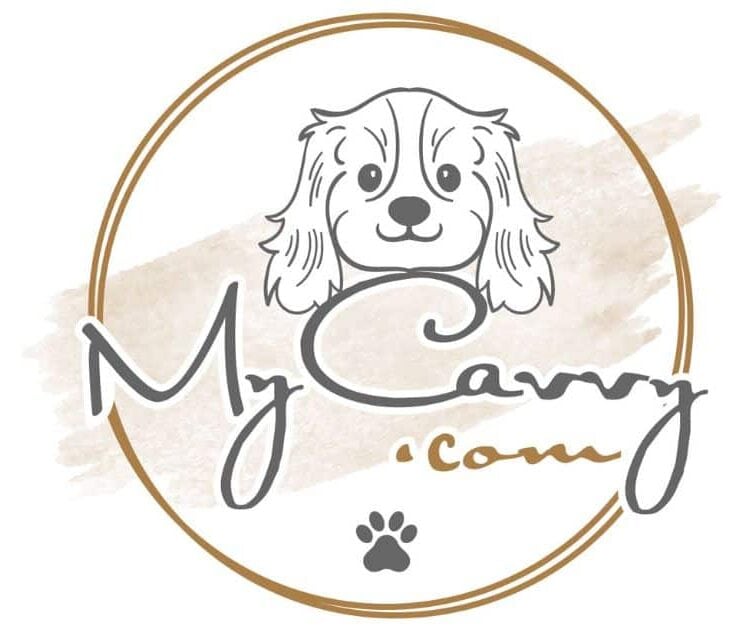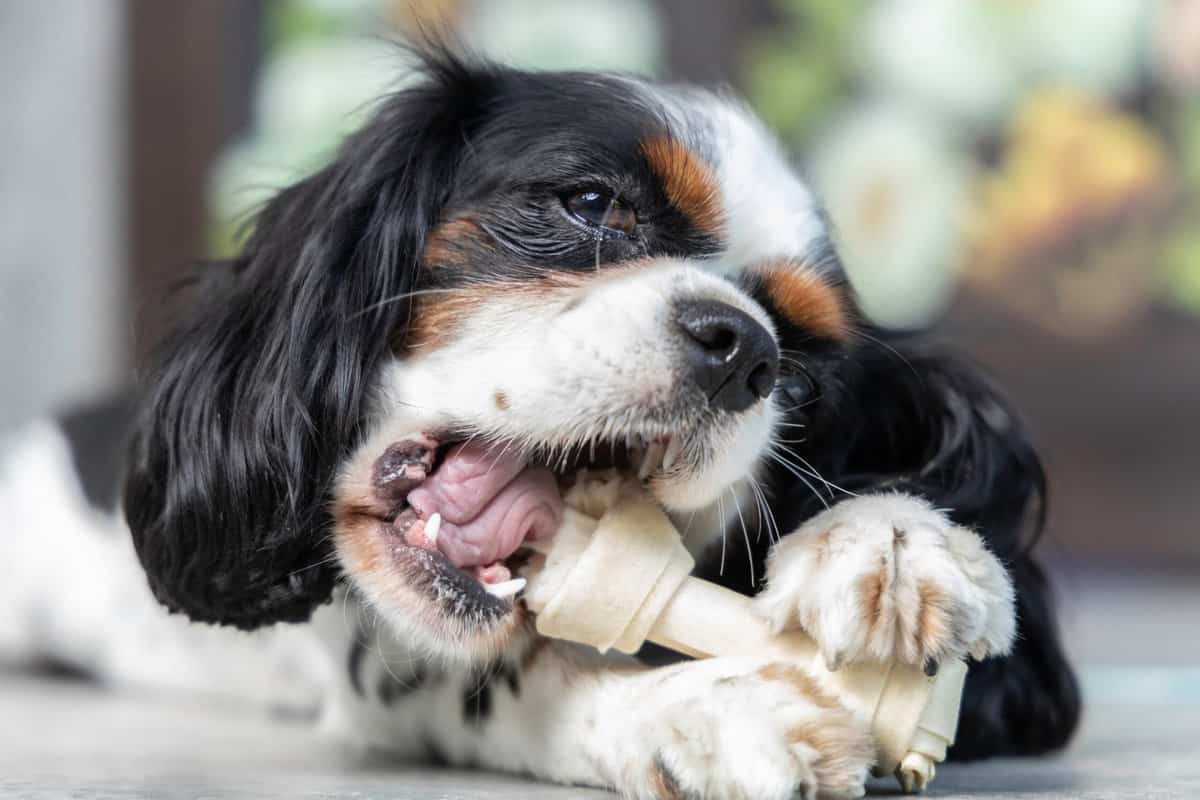Cavalier King Charles Spaniels absolutely love toys and treats, but given the choice, they would pick the treat every time. One popular dog treat is the rawhide bone, a staple in many dog owners’ households for decades.
Cheap and cheerful, rawhide satisfies their natural urge to chew, which promotes dental health and mental stimulation.
But do King Charles Cavaliers like rawhide bones? Are they a healthy treat or a health hazard, and are there any alternatives?
We’ll discover the pros and cons of rawhide bones, specifically for Cavalier King Charles Spaniels, to allow pet owners to decide whether to include these treats in their dog’s routine.
Rawhide Bones and Cavalier King Charles Spaniels
Cavalier King Charles Spaniels, like other breeds, enjoy chewing on rawhides.
Chewing on rawhide bones can help keep their teeth clean and healthy by removing plaque and tartar. However, some rawhide bones contain calories that may contribute to weight gain if consumed excessively.
Dog owners should monitor their dog’s intake of rawhide bones to prevent potential weight issues.
One of the main risks associated with feeding rawhide bones is the potential for choking or blockages in the dog’s digestive tract.
Rawhide can sometimes be difficult for dogs to digest, particularly if they swallow large pieces. This can create blockages in their gastrointestinal system, which can be life-threatening if not addressed by a veterinarian.
Another concern with rawhide bones is the potential for bacteria contamination.
Some rawhides may be produced in unsanitary conditions, leading to the growth of harmful bacteria such as Salmonella or E. coli. These bacteria can cause infections in dogs and humans handling contaminated treats.
Dog owners must purchase rawhide bones from reputable sources and handle them appropriately to minimize the risk of bacterial contamination.
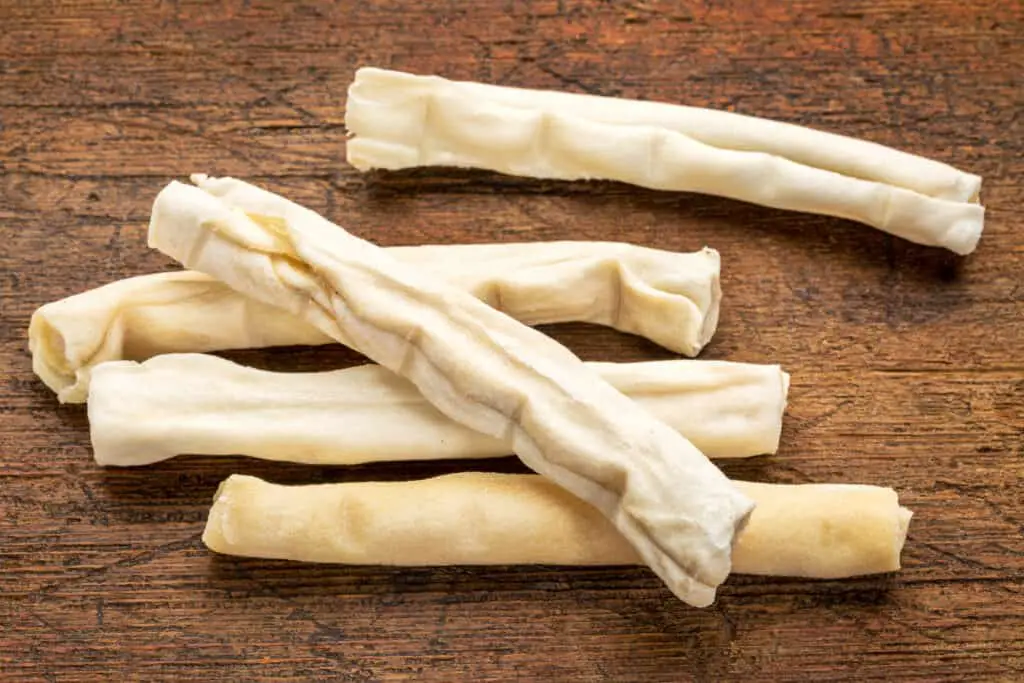
Effects of Rawhide Bones on Dental Health
For all dogs, not just Cavvys these bones can offer dental benefits and satisfy their natural urge to chew.
Chewing rawhide bones helps to mechanically clean the teeth by scraping off plaque and tartar buildup, preventing the development of periodontal disease. This is particularly important for Cavalier King Charles Spaniels, as they are prone to dental problems, according to a study on periodontal disease in dogs.
In addition to dental hygiene, chewing rawhide bones stimulates dogs, alleviating boredom and preventing undesirable behaviors. For breeds like the Cavalier King Charles Spaniel, this mental stimulation is essential for their overall well-being.
However, monitoring your Cavalier while they chew rawhide bones is crucial, as there is a risk of choking or intestinal blockage if a large piece is ingested. Supervising your dog and choosing appropriately sized bones reduces these risks.
What Rawhide Bones Are Made Of
Rawhides are made from the inner layer of cow or horse hides, which are cleaned, cut, and pressed into various shapes and sizes to create the final product.
Health Concerns Related to Diet
While many dogs enjoy rawhide bones, some health concerns are associated with their consumption.
First and foremost, rawhide bones can be a potential source of bacteria like Salmonella or E. coli, which may cause gastrointestinal issues if the dog ingests them. Purchasing rawhide treats from reputable manufacturers and ensuring proper storage is essential to minimize the risk.
Another concern is the chemical treatment involved in producing rawhide bones.
Some manufacturers may use heavy chemicals and preservatives that could potentially harm the dog. As a responsible pet owner, looking for rawhide products made with limited or no chemicals and preferably sourced from organic, grass-fed animals is crucial.
Choking Hazards
Beyond diet-related health concerns, rawhide bones pose a choking hazard, especially for small dogs like Cavalier King Charles Spaniels.
Small pieces can break off when dogs chew on rawhide, leading to ingestion and potential choking. To prevent this issue, monitoring the dog while it chews on a rawhide bone and choosing the appropriate size of rawhide treats for the dog’s size and chewing behavior is essential.
Sharp Edges
Some varieties of rawhide involve different colored plaited strips, and although they look very appealing, the strips can separate and leave sharp edges.
I know this because it happened to us.
Lady had managed to separate the strips, leaving a sharp downturned corner. The sharp edge dug into her chin as she bit down on it. She yelped out, and there was a small cut. It was nothing too dramatic, but still worth mentioning, I think.
Alternatives to Rawhide Bones
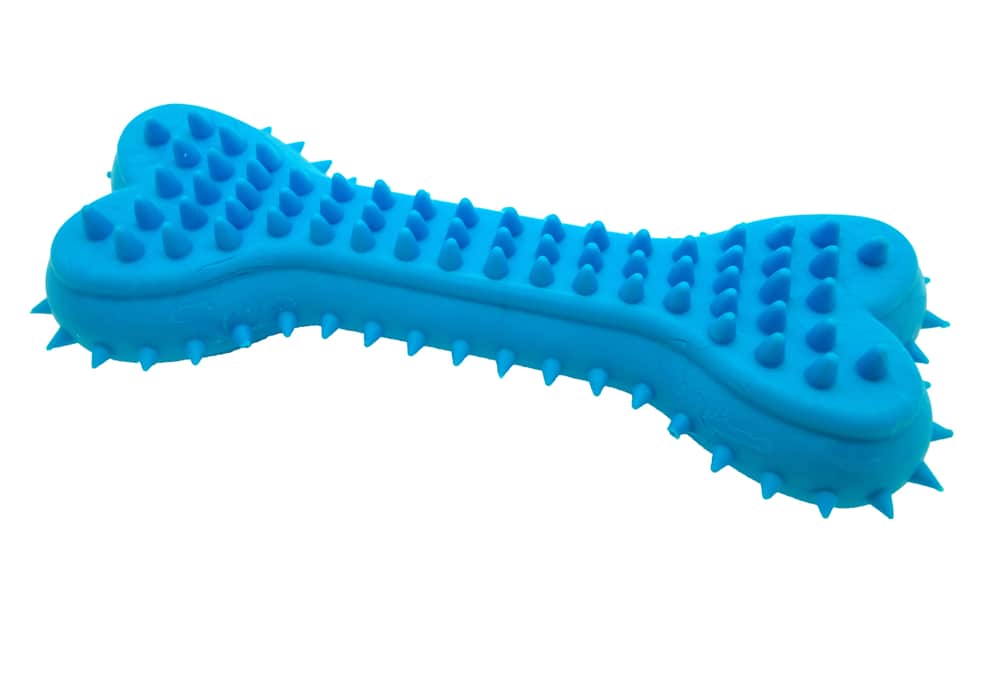
Many alternatives to rawhide still offer mental stimulation, fulfill their natural chewing instincts, and maintain their oral health. Here are some options that are suitable for this breed:
Chew Toys: Many chew toys are available on the market specifically designed for dogs, some of which are made of non-toxic rubber or nylon materials. Toys like the KONG or the Nylabone are highly durable and provide a satisfying chewing experience for your Cavalier King Charles Spaniel.
Edible Chews: If you’re looking for chew treats your dog can safely consume, consider options such as bully sticks, sweet potato chews, yak chews, or dental chews. These chews vary in hardness and durability but can serve as your dog’s healthy and engaging snack.
Interactive Toys: To combine playtime with mental stimulation, interactive toys can be an excellent option for your Cavalier King Charles Spaniel. Puzzle toys, treat-dispensing balls, and slow feeders are great ways to keep your dog entertained and mentally engaged while offering a rewarding treat or meal.
To ensure a balanced diet and avoid overfeeding, you must adjust your pet’s food intake accordingly when offering treats or chews.
Always supervise your dog when providing them with a new chew or toy to ensure their safety. By offering a variety of safe alternatives to rawhide bones, you can keep your Cavalier King Charles Spaniel happy, mentally stimulated, and well-cared-for.
Training with Treats
All dogs, especially puppies, need training of some sort. Obedience training brings out the best in your dog, as they are eager to please you, and as a bonus, provides them with great mental stimulation, which aids with their sleep.
Couple training with treats, and you have one very happy Cavvy.
Although cheap, rawhide bones may not be the best choice as a training treat, as they involve too much chewing. You need a small, quick treat that they can gobble up but not fill them up.
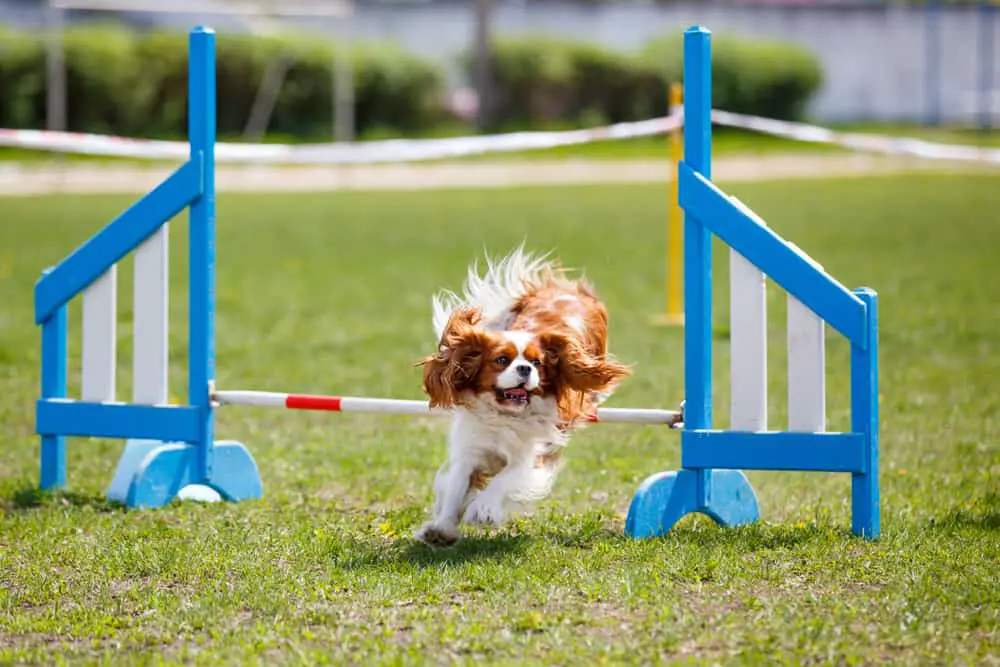
Treat Options
Various other dog treat options can be used for training without the risks of rawhide. Some of these alternatives include:
- Bite-sized, soft dog treats: These are specifically designed for training and are easily consumed by dogs.
- Fresh fruits and vegetables: Options like apple slices, baby carrots, or green beans can be safe, healthy rewards for your spaniel.
- Homemade dog treats: Consider making your dog treats with wholesome ingredients tailored to your dog’s preferences.
Training Techniques
Treat rewards in your spaniel’s training regimen become more effective when combined with clear instructions and positive reinforcement. Some useful tips include:
- Use a consistent command vocabulary: Choose specific words or phrases for each desired action and use them consistently to avoid confusion.
- Keep training sessions short: Cavaliers can have a relatively short attention span, so aim for multiple short training sessions daily.
- Practice off-leash training gradually: Begin in a safe, controlled environment and gradually increase freedom as your dog displays consistent obedience.
- Always pair treats with verbal praise: This reinforces the positive behavior, and in time, your spaniel may respond to praise alone.
Training your Cavalier King Charles Spaniel with treats can be fun and rewarding. By selecting suitable treat options, such as those mentioned above, and using effective training techniques, you can ensure your spaniel learns obedience while maintaining their health and safety.
Conclusion
Cavalier King Charles Spaniels, like most dogs, may enjoy chewing on rawhide bones. These bones can provide mental stimulation and help clean their teeth. However, it is essential to monitor your dog when giving them rawhide bones, as potential risks can be involved.
Rawhide bones come in various types and sizes, so choosing an appropriate bone for your Cavalier King Charles Spaniel is crucial. Selecting a bone that matches their size and chewing style can help reduce the risk of choking or ingestion hazards.
Purchasing rawhide bones from reputable manufacturers is also important to ensure they are free from harmful chemicals and contaminants. Additionally, limiting the amount of time your dog spends chewing on rawhide is advisable to prevent excessive wear on their teeth and potential digestive issues.
Incorporating alternative chew toys or treats made from safer materials, such as rubber or nylon, can provide similar benefits to rawhide bones while reducing potential threats to your dog’s health.
Ultimately, it’s up to the owner to decide whether rawhide bones are suitable for their Cavalier King Charles Spaniel. By considering safety measures and exploring alternative options, you can decide on the best choice for your pet’s chewing needs.
